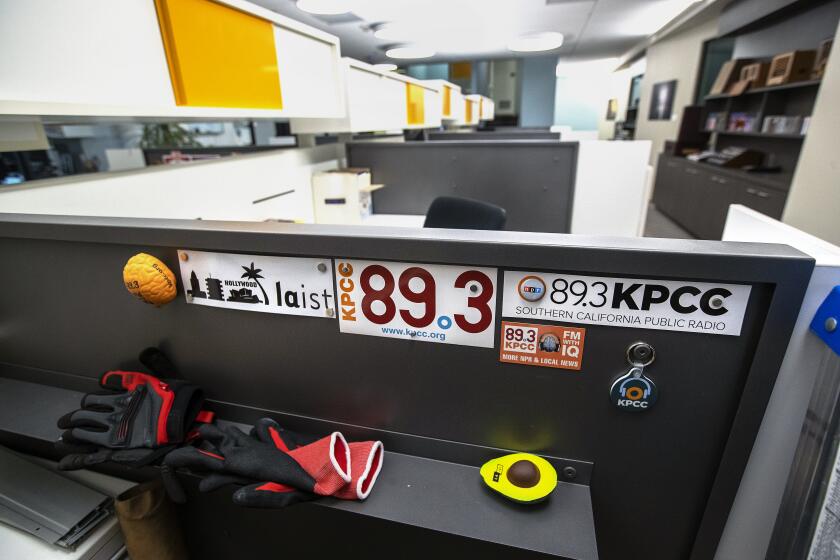Selling an Avant-Garde City to the Rest of U.S. : Marketing: The nonprofit West Hollywood Marketing Corp. was established by the City Council to put ‘the Creative City’ on the map.
It was a novel idea.
Create an image of West Hollywood based on its avant-garde culture--its boulevards, bistros and boutiques. Then market that image convincingly enough to draw businesses and consumers from across the country.
Civic and business leaders today say the nonprofit West Hollywood Marketing Corp., established by the City Council five years ago, has put “the Creative City” on the map.
“West Hollywood was the best-kept secret for 40 years,” said Ron Kates, chairman of the corporation’s board of directors and a commercial real estate broker in the city. “We didn’t have to manufacture an image. All we had to do was recognize who we really were and convey that to the public.”
Although there are no precise figures to measure the corporation’s impact, City Manager Paul Brotzman estimates that it has helped generate as much as $300,000 annually in additional general-fund revenues. Perhaps more important, it has focused national attention on the so-called creative industries that form the city’s economic backbone.
Glossy magazine layouts depict the city as a hub of the entertainment, recording, publishing and interior-design businesses. In fact, the city is home to Warner-Hollywood Studios, Geffen Records, the Writers Guild West and the Pacific Design Center, the largest concentration of showrooms in the country outside New York.
Advertising inserts in Southern California magazines also boast of the city’s night life, highlighted by hip rock clubs along Sunset Strip and famous restaurants such as Spago and Chasen’s.
Now the marketing corporation is focusing on the city’s hotel business, distributing a slick travel video to commercial travel agents and hotel marketers in major cities across the country. And it has hosted two “familiarization tours” recently for the gay and mainstream press.
Revenues generated from retail sales, hotels and restaurants, commercial development and the city’s new business license tax account for more than $17.5 million annually, or more than 60% of the city’s general fund.
“We are dependent on bringing people from outside the city here to spend money,” said Catherine Stribling, the marketing corporation’s executive director. “The marketing corporation has helped broaden the view of West Hollywood in the outside business world. It has helped us say ‘this is a good place to be.’ ”
The image was not always so rosy. The marketing corporation was created in part to counteract negative publicity that accompanied cityhood seven years ago.
The local business community, long accustomed to lax county oversight, feared that stricter zoning regulations adopted by the City Council would drive away new businesses. And in the early years, the council itself received an abundance of unflattering media coverage that focused on controversies surrounding its three openly gay members and incessant squabbling.
Many business leaders credit the marketing corporation with turning things around. Today, they say, West Hollywood is on the cutting edge of municipal marketing. Although most cities have convention/visitor bureaus or chambers of commerce, few have established independent corporations expressly to market local industries. The trend would appear to be catching on, with cities across the country, including Pasadena, Long Beach and Riverside, now setting up similar ventures.
“Every city is vying for those tourist and hotel dollars,” said Bill Vogel, whose advertising firm, the Vogel Communications Group, developed the corporation’s campaign. “The corporation has given the city a competitive edge. . . . West Hollywood really is a pioneer when it comes to marketing destinations to retail tenants and to shoppers.”
Not everyone in West Hollywood, however, is a fan of the marketing corporation. Some residents question whether it has been worth the $1.7 million the city has spent so far to fund it. Early this month the council approved the corporation’s 1991-92 budget of $225,000.
Critics contend that the money could be better spent on the homeless, people with AIDS or numerous social-service providers that contract with the city. And some City Council members believe the marketing corporation should be self-sufficient now, relying more on the business community than on the city.
Those involved with the corporation insist, however, that by helping to increase the city’s economic base, the marketing corporation has actually helped provide more money for social services.
Debbie Potter, the city’s housing and economic development manager, adds that businesses have begun to actively support the marketing corporation, and notes that city funding for the corporation has been reduced annually. Major hotels, for example, now contribute more than $300,000 each year directly to the marketing corporation.
Some critics also contend that the corporation should become more involved with small businesses, particularly on the east end of the city, a generally run-down and crime-plagued area that lacks the glitter generally associated with West Hollywood.
Acknowledging the east end’s problems, corporation officials have begun to look for answers. A series of workshops this fall will bring together city officials, developers, social-service providers, community representatives, architects, urban designers and others to work out a new economic blueprint for the small businesses.
Stribling, the marketing corporation’s executive director, said the group will examine ways to draw more entertainment business to the east end. The group also will look at ways to improve the appearance of storefronts and at ways to draw related businesses to the area.
“This is a grass-roots effort,” Stribling said. “I have very high hopes for the project.”





